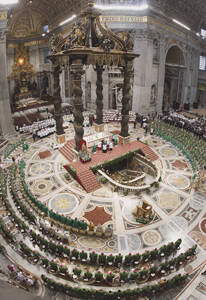Despite the growth of secularism, increased hostility toward Christianity and scandal within the church, members of the Synod of Bishops said they are optimistic about the future because of Christ’s promise of salvation. In a message to Catholics around the world on Oct. 26, as the formal work of the synod closed, synod members said they were certain God “will not fail to look on our poverty in order to show the strength of his arm in our days and to sustain us in the path of the new evangelization.”
Even if the world often resembles a “desert” for Christians, “we must journey, taking with us what is essential: the company of Jesus, the truth of his word, the eucharistic bread which nourishes us,” the fellowship of community and the work of charity, the message said.
Pope Benedict XVI and the synod members—more than 260 cardinals, bishops and priests—along with priests, religious and laymen and women serving as synod observers and experts, began meeting at the Vatican on Oct. 7 to discuss ways to strengthen the faith of Catholics and to encourage lapsed Catholics to come back to the church. While the message described forces hostile to the Christian faith today, the synod members also said, “With humility we must recognize that the poverty and weakness of Jesus’ disciples, especially of his ministers, weigh on the credibility of the mission.”
Addressing Catholics’ involvement in political life, the synod message insisted that “politics requires a commitment of selfless and sincere care for the common good by fully respecting the dignity of the human person from conception to its natural end, honoring the family founded on the marriage of a man and a woman” and working to end “injustice, inequality, discrimination, violence, racism, hunger and war.”
Looking at specific areas of church and social life, the bishops first highlighted the role of the family, “where women play a very special role” in teaching the faith. The bishops promised greater efforts to strengthen and accompany Catholic families. While they condemned efforts to move away from a traditional definition of marriage, they expressed particular concern for divorced, separated or unmarried couples.
Synod members said they were concerned but not pessimistic about the situation of young Catholics around the world, because while they often are under “aggressive attacks” by secular culture, they have “deep aspirations for authenticity, truth, freedom, generosity, to which we are convinced that the adequate response is Christ.”
Identifying what has worked in past evangelization is essential, as is acknowledging what fell short, since mistakes are actually a kind of “new wisdom,” said Adolfo Nicolás, superior general of the Society of Jesus. During a Vatican briefing on Oct. 25, Father Nicolás said the synod should have included more laypeople, who are not only the focus but also the critical agents of the new evangelization.
“It made me think of what Steve Jobs used to say quite often: ‘I’m more interested in the questions of the customers than the questions of the producers,’ and, well, at the synod we were all producers except for a few laypeople,” he said.








